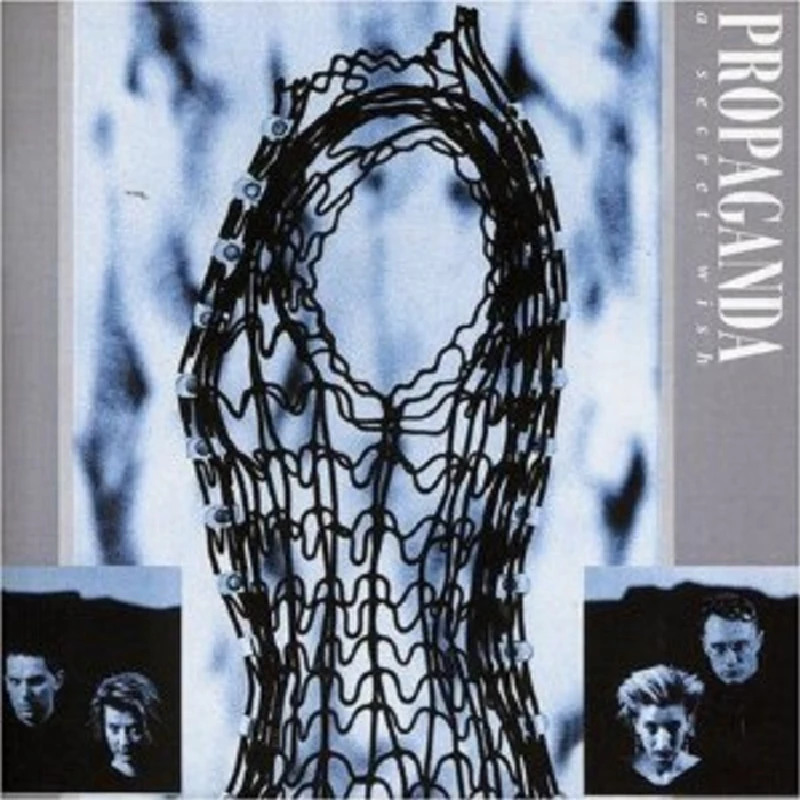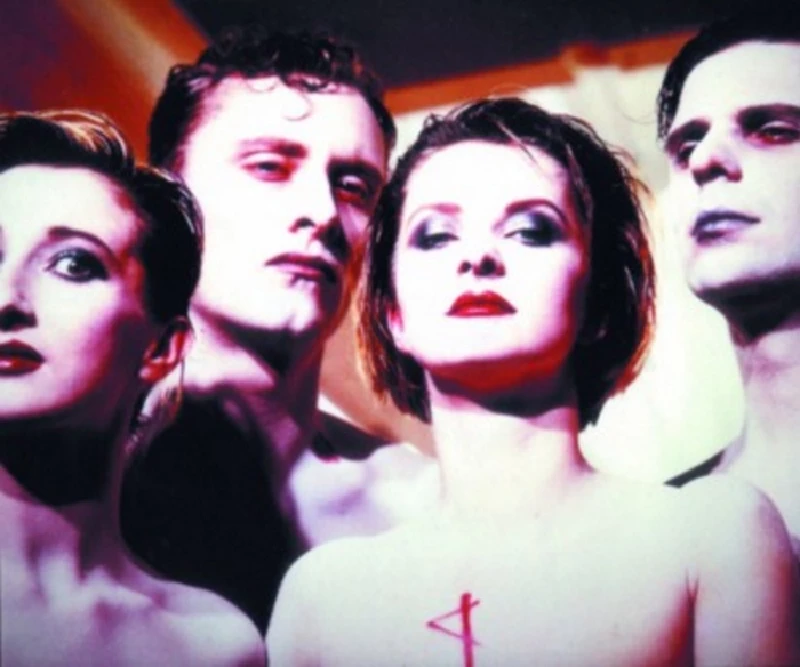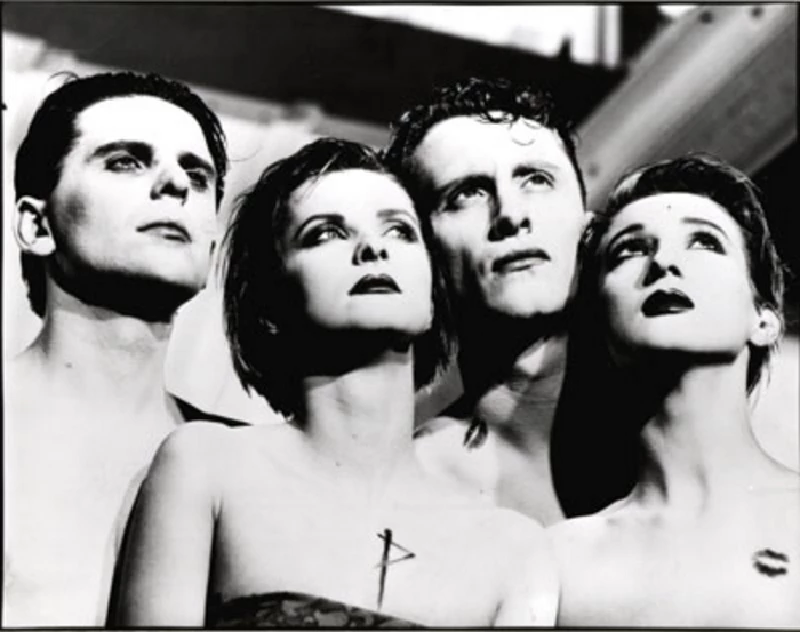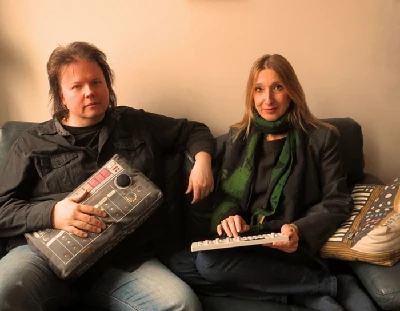Propaganda - A Secret Wish
by John Clarkson
published: 29 / 7 / 2010

Label:
Select Label
Format: N/A
intro
In our 'Re:View' section, in which our writers looks back on albums from the past, John Clarkson reflects upon German electronic group Propaganda's 1985 debut album, 'A Secret Wish', which has just been released in a 25th anniversary edition
The mid 1980’s Dusseldorf-band Propaganda’s career was both fragmented and brief. Their short, but turbulent history incorporated internal band fall-outs and line-up changes, endless studio delays, record company and contract problems and finally finished in litigation and the law courts. They were a band of soaring contrasts. One of their vocalists by her own admission was not a singer; the other had one of the most charismatic voices of the era. They looked to the past for much of their inspiration, yet at the same time their music, which was focused predominantly around keyboards and percussion, even now a quarter of a century on continues to sound industrially futuristic. They were eclipsed in sales and certainly hype by the runaway success of label mates Frankie Goes to Hollywood, but they also produced one of the outstanding pop records of the decade with their 1985 debut album, ‘A Secret Wish’. Propaganda was formed in 1982 by keyboardist Ralf Dorper, programmer Andreas Thein and vocalist Susanne Freytag. Soon afterwards they were joined by Claudia Brucken also on vocals and classically-trained percussionist Michael Mertens. The group, even before Brucken and Mertens joined the band, attracted the interest of Paul Morley, who had recently left his job as a music journalist at the ‘NME’ to become the “Minister of Information” and publicity officer at ZTT, the new label which he had formed with producer Trevor Horn and Horn’s manager wife Jill Sinclair. Propaganda became in early 1983 the second act after Frankie Goes to Hollywood to sign to ZTT. It was the only time in their existence that things were to go their way. With the Frankie phenomenon beginning to take shape after their debut single ‘Relax’ was famously banned by Radio 1 and subsequently went to no. 1 in the singles chart, Propaganda’s debut single, ‘Dr Mabuse’, did not see release until February 1984. ‘Dr Mabuse’ was the only one of their records to be produced by Horn, who had been one of the main reasons why Propaganda had initially signed to ZTT, and who had spent much of the interim before the release of ‘Dr Mabuse’, as well as producing Frankie, co-writing and playing keyboards with another ZTT signing the Art of Noise. It would be over a year before Propaganda’s second single, ‘Duel’, came out in April 1985 by which time Thein, who had fallen out with the rest of the group over their lack of progress, had been fired. ‘A Secret Wish’ followed in a vinyl and tape version in June, and then three months later in a CD version, which contained an extra song ‘Frozen Faces’ and different mixes of some of the tracks. Frankie Goes to Hollywood had had number one hits with their next two singles, ‘Two Tribes’ and ‘The Power of Love’, while ‘Relax’ had crept back up to number two. With Horn busy at work on their double debut LP ‘Welcome to the Pleasuredome’, and releasing remix after remix of the singles to keep them at the top of the charts, David Sylvian was offered the job of producing ‘A Secret Wish’. Although he contributed a melodic line to one of its tracks, ‘P-Machinery’, which eventually became Propaganda’s third single, Sylvian, however, declined. Bizarrely Jill Sinclair next proposed Stock, Aitken and Waterman for the job. The task, however, eventually fell to Horn’s deputy, Steve Lipson. By the time of the release of ‘A Secret Wish’, Propganda was, however, in severe trouble. Relations had become strained between on one side Dorper, Freytag and Mertens and on the other Claudia Brucken, who had married Morley after a quick romance, and was becoming increasingly dominant. The band had also made a classic mistake in that they had not read their contract properly before signing with ZTT. They owed them an initial £250,000 in studio costs and a mercenary 80% of any profits they subsequently made. For all their internal difficulties and the long period of waiting around before it was finally recorded, ‘A Secret Wish’ was, however, fantastic. The German film director Fritz Lang was a prime influence on the album. ‘Dr Mabuse’ was inspired by his 1932 film ‘The Testament of Dr Mabuse’. A metaphor for its time, and the last German film Lang would make before fleeing to America from the Nazis, it tells of criminal mastermind Dr Mabuse who by mind and body control starts to erode away at and to destroy the state through theft, violence and murder. Freytag was not a strong singer, but had a beautiful spoken voice and ‘Dr Mabuse’is opened by her eerily, mysteriously proclaiming “Why does it hurt when my heart misses the beat?” Brucken then takes over with a typically theatrical vocal, warning of Dr Mabuse’s impending chaos and evil. The music has a similar grandiloquence and surreality. Merten’s pounding electronic percussion; Dorper’s sweeping keyboards and an impressive collection of computer and studio effects, each of which have been constantly overlaid over one another, build the track up to orchestral and dramatic proportions. ‘P-Machinery’ was inspired again by Lang and his 1926 silent film, ‘Metropolis’. About a futuristic society dominated by machines, it hurls together whirring synthesisers and thundering industrial noises, as Freytag and Brucken with gleeful tongue-in-cheek irony chant “Power-Force-Motion-Drive-Motion” and ham it up as a work serfs. ‘Duel’, the other single, is in contrast to the heavy industrialisation of much of the rest of album much gentler. It was also ironically Propaganda’s most successful single, reaching no.21 in the singles chart, while ‘Dr Mabuse’ got to no. 27, and ‘P-Machinery’, which came out between the vinyl and the CD version of ‘A Secret Wish’ in July 1985, stalled at no. 50. Taking its lyric from a poem by an obscure Brazilian poet Favlio Volpe and telling a savage story of husband-battering and murder, this bittersweet number is the softest track in Propaganda’s short catalogue and merges a jaunty-toned vocal from Brucken with Dorper’s upbeat synths and light tinkles of percussion from Mertens. Its predecessor and sister track, ‘Jewel’, from which ‘Duel’ eventually drifts out, is, however, the complete opposite. A frantic rush of clamouring harsh beats, its shares the same lyrics as ‘Duel, but this time both Brucken and Freytag howl out its vocals. The other tracks on ‘A Secret Wish’ include the opening number, ‘Dream Within a Dream’, upon which Freytag against the cascading backdrop of a trumpet and synthesisers concludes in a lyric taken from an Edgar Allan Poe poem that everything is illusory. ‘The Murder of Love’ is a cranky industrial number about another love affair having gone violently awry. ‘Sorry for Laughing’ meanwhile is a synthesised cover of a song by the equally brief-lived early 80’s Scottish post-punk guitar act Josef K and ‘The Chase’, which combines rattling synths and percussion beats, is a reflective piece about chasing impossible dreams. For a brief summer Propaganda were critical successes. Their visionary combination of the old and new, tongue-in-cheek irony and dead seriousness earned them a storm of media interest. ‘A Secret Wish’ reached no. 16 in the album charts, but within six months it was all effectively over for Propaganda. Ralf Dorper had always conceived of the group as only being a studio project, but ZTT persuaded the other members of the band to go out on the road. Feeling that it would be impossible to translate Propaganda’s complex musical arrangements out of the studio, he refused to tour. His place in the band was supplemented for the live performances by Kevin Armstrong on guitar and former Simple Minds members Derek Forbes on bass and Brian McGee on drums. Claudia Brucken’s role in the group was also becoming increasingly untenable. The band had always been conceived as a four way partnership, but the other members began to feel that Paul Morley was priming his wife for a solo career. The video for ‘Duel’ thrust her to the fore, and she also recorded a single, ‘When Your Heart Runs Out of Time’ for the Nicolas Roeg film ‘Insignificance’ with Heaven 17 singer Glenn Gregory. Worse still was to come. In October 1985, as the band started to realise the full force of their contract, ‘Wishful Thinking’, a collection of remixes put together by Morley and which only Brucken had been informed of, was put on the market to coincide with the tour. Early in 1986 Dorper, Mertens and Freytag decided to break from their contract with ZTT. With Morley having been fired shortly before Christmas from ZTT after a row with Horn and Sinclair, Brucken too became briefly pro the idea of leaving the label. When she, however, issued the others with the ultimatum that she would take care of their affairs or leave the group, she found herself out of the band. Propaganda spent the next two years in litigation. When Horn and Sinclair found out that they wanted to leave, they hit them with an injunction preventing them from releasing music through anyone else. Dorper. Mertens and Freytag countersued. With other ZTT bands such as Frankie Goes to Hollywood and the Art of Noise having signed equally dubious contracts also taking legal action, the matter was eventually sorted out of court in 1988 with Horn and Sinclair agreeing to let Propaganda go. The band had to still, however, pay the £250,000 in studio costs, a figure that Dorper has since claimed was artificially high. It would take them until 1997 by which time ‘A Secret Wish’ has sold over a million copies to do so. A second, less successful Propaganda album, ‘1234’, came out on Virgin in 1990. By the time of its release though, both Ralf Dorper and Susanne Freytag had left. Only Freytag would appear on the finished recording, and Mertens would complete the album with American singer Betsi Miller and Derek Forbes and Brian McGee. Propaganda‘s tale has never quite, however, drawn to a finish. In 1998, Brucken, Freytag and Mertens reunited to begin work on a third album. While no album eventually emerged, several tracks from those sessions eventually appeared on the internet. 2002 saw Freytag, Mertens and this time Dorper back together, although there were no new recordings. In 2004, revealing that there were ultimately no hard feelings if nothing else, the full line-up which had recorded ‘A Secret Wish’ including remarkably Dorper performed ‘Dr Mabuse’ at a gig at Wembley Arena to celebrate Trevor Horn’s lifetime musical achievements. This year sees ‘A Secret Wish’ reissued in a 25th anniversary deluxe edition with a different mix of the main album, 12” remixes , previously unheard demos and unreleased songs. The history of Propaganda ultimately remains one of missed chances and opportunities. Brilliantly conceived, ‘A Secret Wish’, however, is one of the stand out albums of the 1980s.
Track Listing:-
Band Links:-
https://www.facebook.com/Propaganda-Band-135375113199791/Picture Gallery:-


most viewed articles
current edition
John McKay - InterviewRobert Forster - Interview
Cathode Ray - Interview
Spear Of Destiny - Interview
Fiona Hutchings - Interview
When Rivers Meet - Waterfront, Norwich, 29/5/2025
Carl Ewens - David Bowie 1964 to 1982 On Track: Every Album, Every Song
Chris Wade - Interview
Brian Wilson - Ten Songs That Made Me Love...
Shrag - Huw Stephens Session 08.12.10 and Marc Riley Session 21.03.12
previous editions
Heavenly - P.U.N.K. Girl EPBoomtown Rats - Ten Songs That Made Me Love....
Allan Clarke - Interview
Manic Street Preachers - (Gig of a Lifetime) Millennium Stadium, Cardiff, December 1999
Oasis - Oasis, Earl's Court, London, 1995
Barrie Barlow - Interview
Dwina Gibb - Interview
Beautiful South - Ten Songs That Made Me Love...
Pixies - Ten Songs That Made Me Love...
Sound - Interview with Bi Marshall Part 1
most viewed reviews
current edition
Peter Doolan - I Am a Tree Rooted to the Spot and a Snake Moves Around Me,in a CircleVinny Peculiar - Things Too Long Left Unsaid
Garbage - Let All That We Imagine Be The Light
Vultures - Liz Kershaw Session 16.06.88
John McKay - Sixes and #Sevens
Little Simz - Lotus
HAIM - I Quit
Morcheeba - Escape The Chaos
Eddie Chacon - Lay Low
Billy Nomates - Metalhorse
related articles |
|
Claudia Brucken: Interview (2018 |

|
| Claudia Brucken, the former singer with Propaganda, talks to John Clarkaon about her new album 'Beginn', which she has collaborated on with electronic composer and ex-Tangerine Dream member Edgar Froese. |
| Claudia Brucken: Interview (2014) |
Pennyblackmusic Regular Contributors
Adrian Janes
Amanda J. Window
Andrew Twambley
Anthony Dhanendran
Benjamin Howarth
Cila Warncke
Daniel Cressey
Darren Aston
Dastardly
Dave Goodwin
Denzil Watson
Dominic B. Simpson
Eoghan Lyng
Fiona Hutchings
Harry Sherriff
Helen Tipping
Jamie Rowland
John Clarkson
Julie Cruickshank
Kimberly Bright
Lisa Torem
Maarten Schiethart